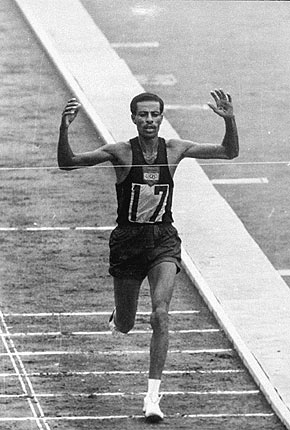*Image Credit: Wikipedia As Olympic victories go, few can match the significance of Abebe Bikila’s triumph in the marathon at the Summer Games of 1960 in Rome. Bikila, having only made the trip due to an injury to a fellow runner, became the first African from a sub-Saharan nation to claim a gold medal in any event, setting a record of 2:15:16.2 — all while running barefoot through the streets of the Eternal City, no less. Born on August 7, 1932 in the tiny village of Jato, Ethiopia, Bikila might have been destined for athletic success from the start — his birthday fell on the same day as the marathon event happening on the other side of the world at the Los Angeles Olympics. In order to support his family, Bikila joined the Ethiopian Imperial Bodyguard as soon as he could, walking to the capital in Addis Ababa to take his position as a private in the service of Emperor Halle Selassie I. As the profile of the Olympic Games elevated during the years after World War II, the Ethiopian government decided to bring in foreign coaches to instruct athletes in the hopes of sending a delegation. Onni Miskanen, a Swede put in charge of developing a running program, identified Bikila and went to work turning him into a world-class runner — but not in time for Ethiopia’s first trip to the Summer Games in 1956 contested in Melbourne, Australia. While standing in the crowd for a parade honoring the athletes who would go, Bikila resolved to one day represent his country at the biggest event in the world. Two years later, having worked with Miskanen to refine his technique and squeeze every last second out of his frame, Bikila entered the National Armed Forces Championship — Ethiopia’s contest to determine representatives at the next Summer Olympics in 1960. Facing national champion Wami Biratu and a host of more experienced athletes, Bikila managed to qualify for the Games by sweeping across the finish line before anyone else. Unknown to that point, he now was guaranteed to be part of the marathon team with Biratu and Abebe Wakgira. As the Games approached, Bikila’s fortunes shifted. Biratu and Wakgira, running better than Bikila during training, moved into the preferred places for the trip to Rome. Now an alternate, Bikila looked likely to stay home while his countrymen took on the historic course. As fate would have it, Biratu broke his ankle and opened a spot for Bikila at the last minute — arriving just in time to take a seat on the plane to the Italian capital. Bikila had made it. Fulfilling a dream he first conceived four years before, he attended the opening ceremonies and, a few days later, would represent Ethiopia in the marathon. During training runs on the Olympic course and Roman side streets, he noticed a problem: his shoes were too worn to survive the 26.2-mile race. Working with Adidas, the equipment supplier for the Games, supplied him with another pair — too narrow and slick for the cobblestone streets he would traverse. Two hours before the race, Bikila decided to forgo footwear altogether. As he lined up with sixty-nine other runners on September 10, 1960, onlookers wondered if he would even be able to complete the event. A little more than two hours later, after sprinting away from his competition for the last 500m, Bikila had set a new world record and earned the first gold medal for a sub-Saharan nation. Asked why he had chosen to continue without shoes, he answered, “I wanted the world to know that my country, Ethiopia, has always won with determination and heroism.” When the Summer Olympics came around again in 1964, Bikila won with a new world record for the second time — wearing shoes this time — just 40 days after having an emergency appendectomy.
September 10, 1960 CE – Abebe Bikila Wins the Marathon at the Rome Summer Olympics
*Image Credit: Wikipedia As Olympic victories go, few can match the significance of Abebe Bikila’s triumph in the marathon at the Summer Games of 1960 in Rome. Bikila, having only…
